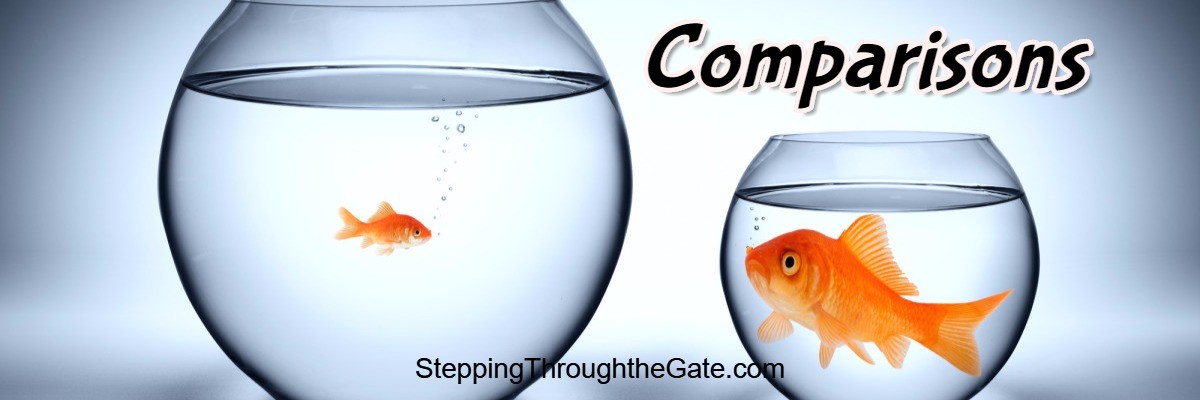“Always be a first-rate version of yourself instead of a second-rate version of someone else.” — Judy Garland
As children grow up, they look to role models for examples of how to live a good life and be successful. As adults, we continue to be aware of the success of those around us, and sometimes look to others for inspiration and encouragement that what we most desire is achievable. But one thing I’ve really been intrigued with in recent days is whether comparisons truly do leave us feeling encouraged and inspired, or if they instead sabotage our efforts.
You see, I am beginning a very personal quest. I have struggled on and off for years to manage my weight and remain physically fit. As I have struggled to find a solution that works for me, I have noted that when it comes to this area and a few others in my life, I get stuck on comparisons. I look at what others have achieved, and I am left feeling “less than.” I wonder why so many others my age have managed to stay active and fit while I have struggled to maintain my once-trim physique. And just like that, my self-satisfaction becomes a house of cards tumbling down at the slightest breeze.
But this view of things is one-sided and misguided because while I am in the throws of comparisons regarding this area of my life, I forget to compare myself in areas where I excel. Truly, if you look outside yourself, you will find people who are successful in one domain but not others. It’s really important to step back and look at the whole scope of things. It’s like the old saying goes:
The grass always appears greener on the other side of the fence. (But is it?)
When I am conscious of it, I can reflect on the fact that success is a very individual and personal matter, and there is no one-size-fits-all standard of achievement. As part of my reflection, I can ask myself “How am I measuring my success?”
Further, a person’s measures of success will vary at different stages of life. When I was in my forties, for example, I had certain measures of success. Now that I am in my “Bonus Years”, I need to re-evaluate and decide if those measures still make sense or whether I need to shift them.
In the life planning I did back then, health was my top priority. I defined health as including five key areas:
1. Physical
2. Emotional
3. Spiritual
4, Intellectual growth
5. Play
At the time, I was a widower with four young kids depending on me. In the same way that the airline safety demonstration instructs you to put on your own oxygen mask first before assisting others, I realized that being healthy was really important. I knew that if I didn’t take care of myself, I wouldn’t be there to care for my family.
Even though my children are all grown up, it’s still important for me to be healthy, but for slightly different reasons.
 Physical health in particular, will support so many other important goals and desires that I have for my life. In addition to continuing my work as a speaker and coach, I want to be free and fit to let myself explore; I love travel. I have a train trip to Chicago, and some other trips to see family and close friends on my agenda for the near term.
Physical health in particular, will support so many other important goals and desires that I have for my life. In addition to continuing my work as a speaker and coach, I want to be free and fit to let myself explore; I love travel. I have a train trip to Chicago, and some other trips to see family and close friends on my agenda for the near term.
While I am working at making physical health center stage in my list of personal success measures, your measures will likely be completely different.
Do you desire to measure your success by:
Achieving your goals?
Raising your kids?
Having a loving relationship?
Doing fun, adventuresome things?
Having great supportive friends?
Doing fun, fulfilling things to create an income?
Having a nice home?
Making money?
Having a lot of money in your retirement fund?
Losing weight?
Staying fit?
Giving a good presentation?
Effectiveness of helping others?
One of infinite other ways?

In other words, forget comparisons and think “what do I need to do for me?” Remember, no matter what category you choose, you will always find someone that can appear more or less successful, so the important thing is to figure out what’s important to you.
Getting clear about your own priorities and measuring yourself against your own standards rather than somebody else’s will go a long way toward helping you to live a good life on purpose.
Steering clear of the land of comparisons and its sabotaging effects is not always easy. Here are the four steps I follow when I am feeling uncertain about my performance in a given area of life:
1. If I am starting to feel inadequate or beaten-down, one of the first things I observe is whether I have entered the land of comparisons. If the answer is yes, I know from experience that there is no cheese down that hole and I am just setting myself up for misery.
2. Get really clear about what I want to create for myself. What would make me happy and satisfied?
3. Look at what actions I need to take to make that happen. Who do I need to ask for support? Examples are an accountability buddy or support group to make significant change happen.
4. Be generous with myself in recognizing accomplishments and achievements along the way.
My personal challenge at the moment is to remember these four steps as I shift my priorities and goals to suit my own personal desires and purpose in my Bonus Years. As long as I can steer clear of comparisons, I know I am 90% of the way there.
Now it’s your turn.
How do you measure success for yourself in your life?
How do you measure success for yourself at this stage in your life?
Success measurements change as we get older. What are your “Bonus Years” measurements?

